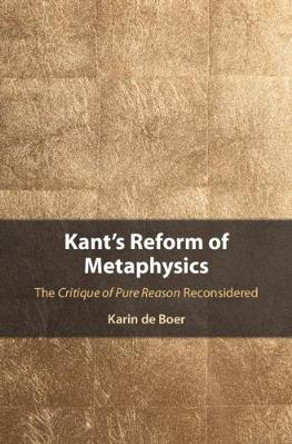In his Critique of Pure Reason, Kant argued that human reason is inherently conflicted, because it demands a form of unconditioned knowledge which is unattainable; his solution to this conflict of reason relies on the idea that reason's quest for the unconditioned can only be realized practically. Karin Nisenbaum recommends viewing this conflict of reason, and Kant's solution to this conflict, as the central problem shaping the contours of post-Kantian German Idealism. She contends that the rise and fall of German Idealism is to be told as a story about the different interpretations, appropriations, and radicalization of Kant's prioritizing of the practical. The first part of the book explains why Kant's critics and followers came to understand the aim of Kant's critical philosophy in light of the conflict of reason. According to Nisenbaum, F. H. Jacobi and Salomon Maimon set the stage for the reception of Kant's critical philosophy by conceiving its aim in terms of meeting reason's demand for unconditioned knowledge, and by understanding the conflict of reason as a conflict between thinking and acting, or knowing and willing. The manner in which the post-Kantian German Idealists radicalized Kant's prioritizing of the practical is the central topic of the second part of the book, which focuses on works by J.G. Fichte and F.W.J. Schelling. The third part clarifies why, in order to solve the conflict of reason, Schelling and Rosenzweig developed the view that human experience is grounded in three irreducible elements--God, the natural world, and human beings--which relate in three temporal dimensions: Creation, Revelation, and Redemption.
About the AuthorKarin Nisenbaum is Assistant Professor of Philosophy at Colgate University. Her research focuses on issues of metaphysics and practical reason in Kant's critical philosophy, as developed by post-Kantian thinkers such as Fichte and Schelling and by Jewish philosophers such as Maimon and Rosenzweig.
ReviewsThis is an excellent book, and it is essential for further research on the development of post-Kantian thought. * Gunnar Hindrichs, Journal of the History of Philosophy *
The brief summary here does not come close to doing justice to Nisenbaum's rich and provocative book, nor does it capture the deep commitment to the importance of philosophy that she clearly displays ... [it] will be of great value to anyone interested in the period, or in the fate of metaphysics more broadly. * Peter Thielke, Notre Dame Philosophical Reviews *
Book InformationISBN 9780190680640
Author Karin NisenbaumFormat Hardback
Page Count 296
Imprint Oxford University Press IncPublisher Oxford University Press Inc
Weight(grams) 454g
Dimensions(mm) 157mm * 239mm * 25mm









